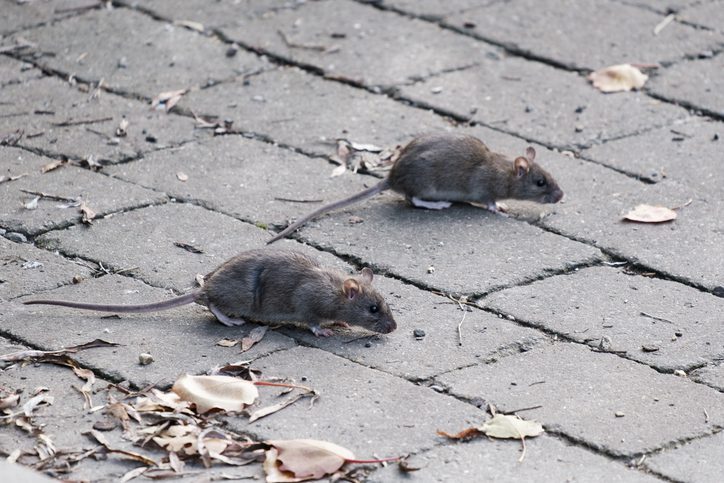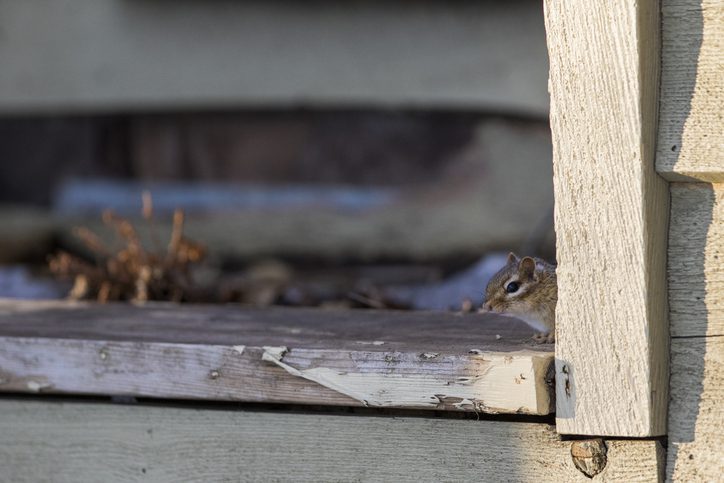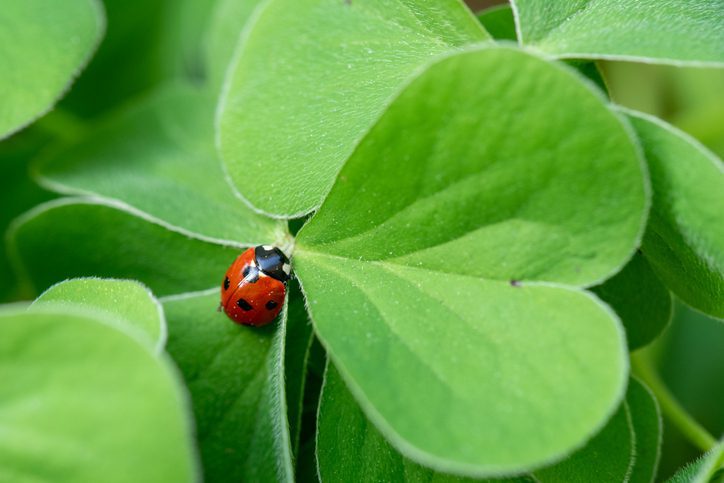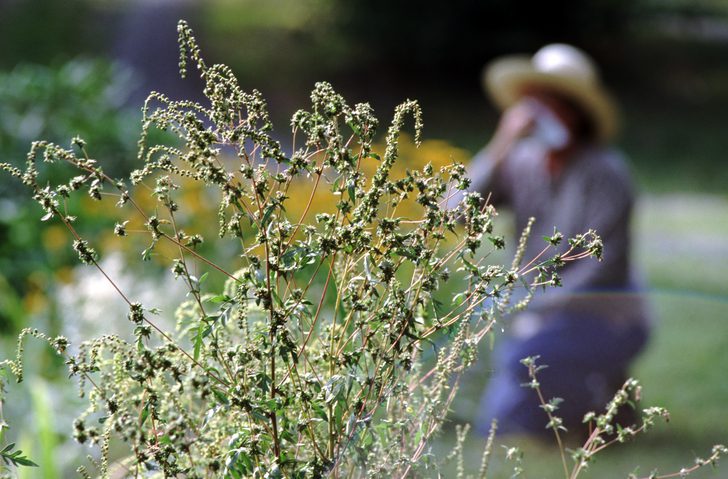Have you ever flipped the light switch just in time to cringe at the sight of a cockroach or mouse scuttling across your kitchen counter? Maybe backyard mosquitoes disrupt your deck time with blood-sucking bites. These pests aren’t just annoying: Many are destructive or pose health hazards.
Cockroaches, for example, carry bacteria that can cause salmonella, staph and skin infections, or trigger asthma. Mice and rats carry and spread bacterial and viral diseases. Mosquitoes transmit diseases such as dengue fever, and ticks can spread Lyme disease. Termites and carpenter bees can destroy your deck or home.
You may be tempted to grab a can of chemical insecticide or set out bait stations to rid your home and yard of bothersome bugs and rodents. But there are many pest-control options to repel unwanted visitors without the potential health risks and side effects of chemical pesticides.
Below, we’ll dive into which insects and critters are most common where you live and share the best natural ways to keep your yard and home free of insects, spiders and more.
Watch for These Regional Pests
The most common home and yard pests vary by region. Here’s a rundown of the most common regional insects in the U.S. from the National Pest Management Association (NPMA).
- Southeast: Mosquitoes, termites, flies
- South Central: Mosquitoes, ants, cockroaches
- North Central: Ants, cockroaches, ticks
- Northeast and New England: Ants, ticks, stinging insects
- Great Lakes, Ohio Valley, Midwest: Ants, ticks, stinging insects
- Northwest: Ticks, cockroaches, earwigs
- Southwest: Ants, cockroaches, rodents
A recent report from pest control company Terminix reported several Florida cities with high rodent populations: Tampa-St. Petersburg, Miami-Fort Lauderdale, Orlando, Daytona Beach-Melbourne, Jacksonville, Pensacola and West Palm Beach-Fort Pierce.

The following cities, along with many regions in Florida, are also likely to have the highest rodent activity in 2025, according to the NPMA:
- Boston
- Denver
- Grand Rapids, Michigan
- Louisville, Kentucky
- New Orleans
- Salt Lake City
- Seattle
- Washington, D.C.
The Buzz on Repelling Bees, Mosquitoes and Other Insects
Now that you know which pests can’t wait to crawl or fly into your home and yard, here are some simple ways to keep them at bay.
1. Seal Food and Drink Containers
Nothing attracts cockroaches, ants and other insects like an all-they-can-chomp buffet. Never leave open chip bags, cookie packages, uncovered food or crumbs around the kitchen and house. Empty trash and recycling bins often. Cockroaches love water, so make sure you wipe any water from kitchen counters, empty glasses and cups and drain water from the sink.
2. Try Essential Oils
Many essential oils act as insect deterrents. You can make a DIY essential oil spray or place oil in saucers and oil-soaked cotton balls or scented sachets in cabinets, drawers, closets, near trash and recycle bins and other pest-attracting areas.
Always dilute essential oils with water, adding an emulsifier such as liquid castille soap, aloe vera gel, alcohol or apple cider vinegar, especially if you have asthma or another respiratory condition as these highly concentrated oils can cause breathing difficulties. For proper bug spray dilutions, search online for essential oil dilution charts such as this chart from The Northwest School of Aromatic Medicine. Also ventilate rooms where you use essential oils by opening a window and/or using a fan to allow air flow.
Essential oils that may help keep insects away include away include:
- Mosquitoes: Lavender, peppermint, tea tree, basil
- Flies: Lavender, Thyme, tea tree
- Moths: Lavender, cedarwood
- Ants: Lavender, peppermint
- Ticks: Tea tree
- Bees: Peppermint, eucalyptus, citrus oils
- Cockroaches: Oregano, eucalyptus, mint, rosemary and yarrow
- Termites: Wintergreen
- Fleas: Tea tree
- Spiders: Peppermint, citrus oils, citronella, lavender, tea tree, cedarwood, eucalyptus
- Flies: Vetiver, cinnamon and lavender
You can find essential oil sellers and DIY essential oil pest repellent recipes online.

3. Wear Bug Repellent and Barrier Clothing
Cover bare skin that insects love to bite with long-sleeved shirts, long pants, socks, hats and jackets. Thicker fabrics like denim also act as barriers for mosquito, tick and other insect bites. Avoid open-toed shoes, opting for hiking boots or another walking shoe instead.
4. Pick Up Some Insect-Repelling Plants
You can also grow plants like lavender, peppermint and lemongrass in the home to repel bugs and flying insects.
Natural Ways to Send Rodents Scurrying
It’s no fun setting out mouse traps and disposing of the grisly results. So, prevention is key to keep mice, rats, chipmunks and other rodents out of the home and garage.

1. Get Rid of Rodent Hideouts
Dispose of stacks of papers and food and drink containers in the garage, basement and other areas. Mice, rats and other rodents love to nest in these cozy hiding places.
2. Plug Holes and Cracks
Seal gaps mice can squeeze through with caulk. For larger holes, use steel wool and attach with caulk or spray foam. For larger holes, use lath screen, cement or metal sheeting to close the point of entry.
3. Keep Wildlife Food Away from the Home
Hang bird feeders away from the house so rodents don’t gravitate to seeds on the ground. Woodpiles are mouse havens, so store firewood away from the house.
4. Make DIY Rodent Deterrents
Natural mice and rodent repellents include clove, mint and peppermint oils. Pestcentric, an online natural pest control resource, recommends making a spray by mixing one-half cup of witch hazel or rubbing alcohol with one-half cup of water and one teaspoon of peppermint or another essential oil. Spray or wipe down kitchen counters, cabinets and sink areas. Mice can’t stand hot spices, so sprinkle cayenne pepper where you see mouse droppings.
Stuff scented dryer sheets in potential nesting areas to keep mice away. Spray apple cider vinegar in mice-prone areas like garages, basements and attics. This strongly scented vinegar also works as a spray for kitchen countertops, recommends Pestcentric.
Pest-Proof the Yard and Garden
Nothing ruins a night on the deck like a mosquito chomping into your neck or a tick latching onto a hidden patch of skin. But these bugs don’t have to keep you inside on a balmy summer evening.
1. Send Them Away with Citronella
To help prevent mosquitoes in the yard and around the deck or patio, light citronella torches and candles. You can also plant citronella in the yard or in containers around the deck or patio. Instead of using a chemical mosquito repellent such as DEET for moquitoes, try picardin, a synthetic compound that stops mosquitoes from sensing the juicy buffet of your body.

2. Plant Bug-Repellant Herbs and Flowers
Plant mint, lavender and basil in the flower or vegetable garden or around the deck and yard to repel mosquitoes. Calendula, marigold, pansies and violets trap slugs. Calendula and dianthus also attract bees and other pollinators. Plant garlic and aster to attract pollinators and deter aphids.
Other plants to repel bugs include rosemary, basil, dill, geraniums, petunia for beetles and sage for flea beetles. Tarragon also repels a number of insects.

3. Introduce Beneficial Bugs
“Beneficial” predatory insects such as ladybugs and wasps kill destructive bugs to flowerbeds and vegetable gardens. Don’t want to wait for beneficial insects to find your garden? Purchase live beneficial bugs online or at a local garden or nursery center and drop them into your plant beds.

Swat Pests Out of Your Life Naturally
Now that you know natural methods for repelling bugs, spiders, buzzing flies and mosquitos and skittering rodents, it’s time to begin bug- and rodent-proofing your yard and home. Shop for essential oils targeting insects in the home and pull on your gardening gloves to plant bug-deterring flowers and herbs.
While you’re at it, clear out boxes, food containers and papers for recycling so rodents don’t see an all-they-can-eat buffet that also serves as a cozy nesting place.







I really enjoy the helpful hints and articles you send out. Thank you!!
Bonnie
Very helpful.
I found the article to be very helpful. I like experimenting with essential oils.
This is very helpful for all rodent’s. Thank you so much for sending me this cause I do have problems with flying insects and ants.
I would like information on getting rid of goffers in the garden.
Yes it was helpful
Yes, I use several of these methods and have great success. I’m a fanatic about water left in sinks and on counters. It keeps away bugs. I also clean counters and the floor under the front of cabinets with a wipe several times a day to clean up any little spot of food or liquid. It’s amazing what we humans leave behind after meals or a snack!
I live using herbs and flowers in the beds around the house, especially mint, works wonders. I’m thinking about some more options. Thank you!
Any advise on how to repell Hornets and wasps.